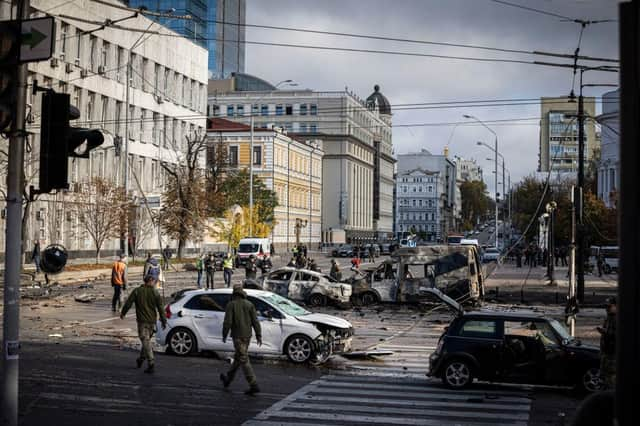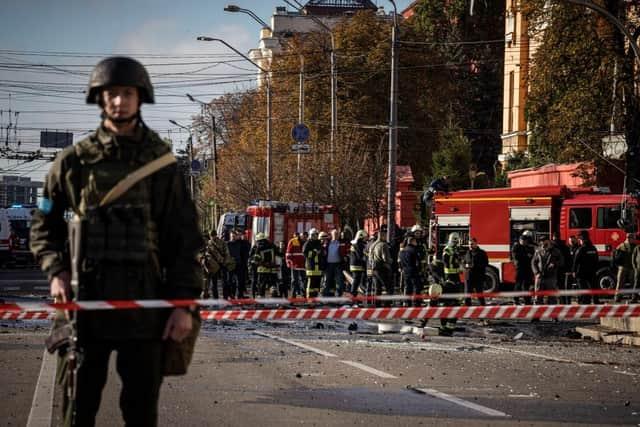Ukrainian woman moves from Scotland to Kyiv, just as attacks began


“We have a lot of terrifying news from Ukraine,” she said, from a train carriage somewhere between Warsaw and Kyiv. Businesswoman Ms Bondar, 33, had decided to return to Ukraine after missing her family and partner back home. She moved to Edinburgh to live with a host under the Homes for Ukraine visa scheme in April.
Kyiv, despite daily air raid alerts, had not been subject to direct missile attacks since the first few weeks of the war and life had begun to return to normal. Cafes and restaurants had reopened and people were enjoying something akin to normal life. In the western city of Lviv, too, there was relative safety, compared to the occupied regions in the east which were annexed by Russia earlier this month.
Advertisement
Hide AdAdvertisement
Hide AdYet both cities – and at least eight more across Ukraine - came under intense missile attack early on Monday morning in one of the most widespread Russian assaults on civilians since the beginning of the invasion. At least 11 people were killed and 60 injured, while four regions of the country were left entirely without power.


Russian president Vladimir Putin said the attacks were in response to a blast that hit a key Russian bridge to the annexed Ukrainian territory of Crimea over the weekend, which he called a “terrorist attack.’’ He threatened further strikes if Ukraine continued to hit Russian targets, saying that Ukraine’s intelligence agencies were responsible for “terrorist acts” on Russian soil.
“Let there be no doubt,” Mr Putin said in a speech to his security council, which was broadcast on TV. “If attempts at terrorist attacks continue, the response from Russia will be severe.
Ms Bondar, who had lived in Scotland through the Homes for Ukraine visa scheme, arrived home, into Kyiv’s main station, just as the all-clear was sounding.
In central Kyiv, a pedestrian bridge was hit, alongside residential buildings. Other casualties were cultural buildings and objects, including the Hrushevsky monument, commemorating Mykhailo Hrushevsky, the first president of Ukraine after World War One; the Taras Shevchenko Museum, dedicated to Ukraine’s national poet, as well as the Khanenko art museum and the building that houses the country’s philharmonic orchestra. Some commentators believe the strikes on the structures could have been a targeted attack against Ukrainian culture.
The German consulate in Kyiv was among the buildings damaged in the attacks, however a spokeswoman for the German Foreign Ministry said it had not been in use since the war began.
The mayor of Kharkiv said that the energy infrastructure facility was damaged, electricity was lost in some areas and there was no water supply to the city. Lviv also entirely lost power.
Ukrainian president Volodymyr Zelensky addressed the country on Monday morning, while foreign minister Dmytro Kuleba said he would cut short a visit to Africa and return to Ukraine “immediately” in light of the attacks.
Advertisement
Hide AdAdvertisement
Hide Ad"This morning is difficult. We are dealing with terrorists. Dozens of missiles, Iranian drones,” Mr Zelensky said.
Iran has repeatedly denied sending drones to Russia to support their war effort.
Later on Monday, he spoke to UK Prime Minister Liz Truss and said afterwards that he “counts on UK leadership” in protecting Ukraine’s skies, adding that the pair had discussed “further decisive actions to increase pressure on Russia”.
Video footage circulating on social media showed people, including children, singing the Ukrainian national anthem during long air raid alerts in Metro station bomb shelters. The all clear finally sounded after more than five and a half hours, before starting up again in late afternoon.
There were also said to be long queues at petrol stations as people prepared for the possibility of evacuation – something which has not been seen in Kyiv since February., However, many shops reopened shortly after the air raid ended.
Tymofiy Mylovanov, president of Kyiv School of Economics, told The Scotsman that the feeling in the capital was defiant.
"I have come up from the bomb shelter to make this call and even though there is an air raid on, there is a guy cutting the grass in front of the building: that is how the mood is,” he said. "I have spoken to some of my students, who say they are going back to their home towns, but that’s a natural reaction. We’ll see what happens, it is too early to say. If it goes on for another week, daily, probably people will be more serious about this and perhaps will start moving [abroad] again, but for now, no.”
Former government minister Mr Mylovanov says the first set of missile attacks were clearly aimed at civilian infrastructure. He pointed to a park and children’s playground, the Shevchenko Park – usually packed with street musicians and people playing chess - which was hit by a Russian strike.
Advertisement
Hide AdAdvertisement
Hide Ad“I know that place,” he said. “I played there when I was a kid, because I grew up near there. And I dance there sometimes, on the weekends. But basically, there's nothing there which is even remotely resembling military infrastructure. So that makes it a terror attack, because it doesn't attack our military installation.”
Alexander Kamyshin, chief executive of state-owned Ukrainian Railways, took to Twitter to express his regret that some of his network was not running on time due to the attacks.
"37 trains delay. Don’t like it,” he said.
The intensified attack has also escalated tensions with other nations.
Moldova’s foreign affairs minister, Nicu Popescu, said he had summoned the Russian ambassador after missiles launched on Ukraine had passed through Moldovan air space.
"Three cruise missiles launched on Ukraine this morning from Russian ships in the Black Sea crossed Moldova's airspace,” he said. “I instructed that Russia's ambassador be summoned to provide an explanation.
"Moldova condemns in strongest possible terms violation of its airspace by three Russian cruise missile as Russia attacked Ukrainian cities this morning. We condemn Russia's continued aggression against Ukraine.”
Meanwhile, Belarus and Russia agreed to deploy a "joint regional group of forces" manned by the Belarusian military.
Belarusian president Aleksandr Lukashenko, who recently gifted Russian president Vladimir Putin a tractor for his 70th birthday, told a meeting of security officials in Minsk that Ukraine was being "pushed by their patrons to unleash a war against Belarus" and warned Ukraine against strikes on his country.
Advertisement
Hide AdAdvertisement
Hide AdNato’s secretary general, Jens Stoltenberg, condemned the “horrific and indiscriminate” missile attacks.
He said he had spoken with Ukrainian foreign minister Mr Kuleba, and pledged Nato’s continued support for Ukraine against Russian aggression “for as long as it takes”.
United Nations spokesperson Stéphane Dujarric said the attacks were “another unacceptable escalation of the war”.
Comments
Want to join the conversation? Please or to comment on this article.
